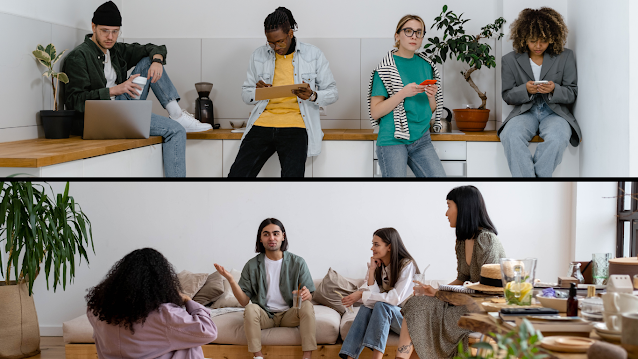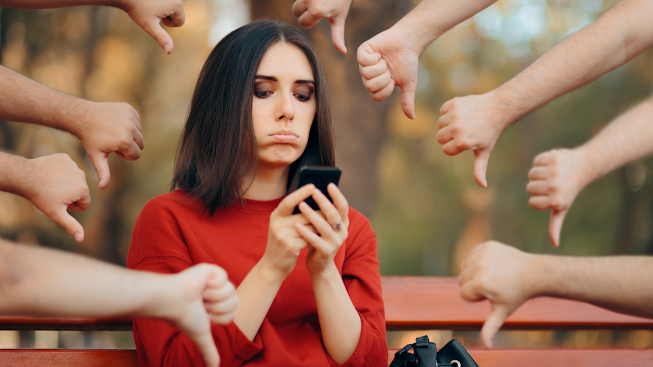The Loneliness Epidemic: Unraveling the Impact of Social Media on Generation Z and Millennials
In the age of unprecedented connectivity, one might assume that loneliness is a thing of the past. However, the paradox lies in the fact that despite being more connected than ever, we are living in the loneliest society in history. The omnipresence of social media has become a double-edged sword, offering a lifeline of virtual connections but leaving us adrift in the vast sea of loneliness. According to a study by Cigna Health Insurance, a staggering 46% of Americans admit to feeling alone, questioning whether our extensive use of social media exacerbates the issue or is merely a coping mechanism.
Research from the Pittsburg School of Medicine delves into
the correlation between social media use and loneliness, revealing that adults
spending more than two hours a day on these platforms have double the chances
of experiencing loneliness and social anxiety. The frequency of visits matters
too; those checking social media more than 50 times a week triple their
likelihood of feeling isolated. However, limiting social media use to just 30
minutes a day has been suggested as a potential remedy for improved mental
health and overall well-being.

Social media can be a temporary lifejacket for those drowning in loneliness, offering a semblance of connection. However, the illusion shatters when users log off, leaving them more isolated than ever. The displacement of real-world interactions is one of the consequences, as individuals miss out on crucial social experiences and struggle to form deeper personal connections. The over-idealized exposure to curated lifestyles further exaggerates feelings of loneliness, fostering a false sense of inadequacy and lower self-esteem.
The negative impacts extend beyond the individual, with
social media fostering a society where events and celebrations are broadcasted,
leaving those not included feeling excluded and alone. The overuse of social
media can lead to psychological changes, inducing feelings of sickness and
exacerbating the loneliness epidemic. The constant comparison trap and the
obsessive need to check notifications contribute to the deterioration of mental
health.

Amidst the gloom, there is a glimmer of hope. Technology, if
used mindfully, can be a tool to forge offline connections. Rather than
substituting real-world interactions, social media should serve as an enabler
for genuine, meaningful connections. Research emphasizes that those engaged in
personal, meaningful interactions report better health and lower loneliness
scores. It is crucial to strike a balance and use technology to enhance, not
replace, our connection to the real world.
While the loneliness epidemic affects society as a whole,
Generation Z and Millennials seem to be the worst hit. This generation,
boasting thousands of virtual friends, paradoxically experiences a lack of
real-life connections. The rise of #Loneliness is a pandemic within itself,
stripping these young adults of essential emotions, care, love, and community
feelings vital for a healthy society.
The lack of personal bonding and societal living experiences
has turned Generation Z and Millennials into loners in real life, even as they
maintain an online facade of social connectedness. The virtual world cannot
replace the tangible sense of belonging derived from physical connections. Real
emotions, whether happiness or pain, can only be fully experienced in the
physical presence of others.
.png)
In this challenging era of calamities, pandemics, war, and
unrest, the survival and thriving of humanity depend on intricately connected
hyperlocal communities. Netclan recognizes this need and is dedicated to
building tightly-knit societies and hyperlocalities by connecting the
unconnected across continents. For Generation Z and Millennials, Netclan offers
a lifeline, bridging the communication gap and combating loneliness.
Netclan's commitment to connecting the unconnected aligns
with the urgent call to build coherent, caring, and happy neighborhoods. In a
world where human connection is the antidote to loneliness, Netclan emerges as
a catalyst for change. It strives to overcome social phobia and facilitate
social interactions for those too shy to connect, those whose hobbies hinder
friendships, those feeling misplaced, and those grappling with the challenges
of relocation.

In conclusion, the loneliness epidemic is a complex issue intertwined with the rise of social media. While technology connects us in unprecedented ways, its misuse exacerbates loneliness. Generation Z and Millennials bear the brunt of this crisis, yearning for real connections amidst their virtual friendships. Netclan, with its mission to connect the unconnected, stands as a beacon of hope in combating loneliness and building communities that thrive on genuine, meaningful interactions. As we navigate the digital age, it's crucial to remember that technology should enhance our lives, not replace the profound connections that make us human.
.jpg)

.png)
.png)
Comments
Post a Comment